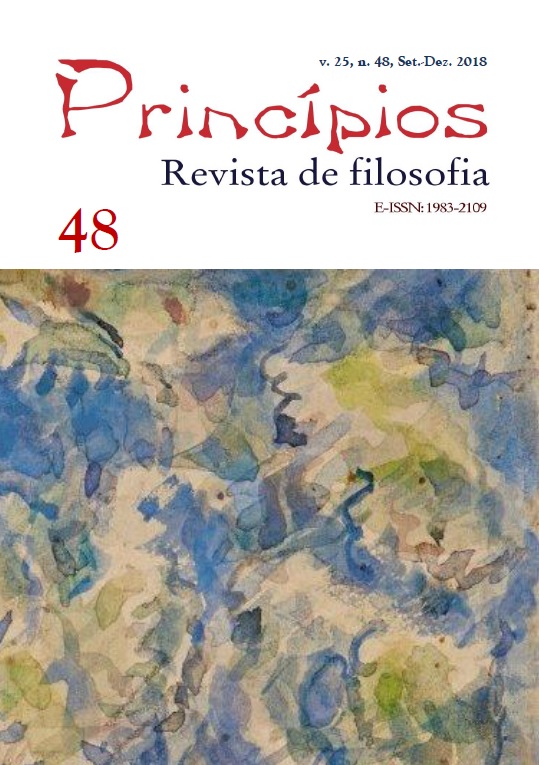Introspection in Hannah Arendt
Rahel Varnhagen, a pariah in search of the world
DOI:
https://doi.org/10.21680/1983-2109.2018v25n48ID14055Keywords:
Introspection, World, Rahel Varnhagen, ArendtAbstract
Introspection is subject on the last chapter of The Human Condition (1958). On that chapter, Arendt elaborates on introspection and the loss of common sense. In this context, we understand the loss of common sense as the loss of shared sense or, in other words, as the emptying of the world. When introspection becomes a characteristic of the individual based on this movement of turning to oneself, the whole world is at stake. That is, it implies the loss of what makes us politicians and we also lose plurality. Rahel Varnhagen was, from our point of view, the greatest expression of this introspection brought up by Hannah Arendt. According to Arendt, in Rahel, reality is subsumed in the recesses of the “soul” and, behind closed doors, no longer desires the world. Therefore, the question remains: can public life be constituted as a political life based on introspection? We chose as the literature contribution the works The Human Condition (1958) and Rahel Varnhagen (1957). We chose as methodology the textual exegesis.
Downloads
References
AGUIAR, Odílio. A resistência em Hannah Arendt: da política à ética, da ética à política. In: DUARTE, André et al. (Org.). A banalização da violência: a atualidade do pensamento de Hannah Arendt. Rio de Janeiro: Relume-Dumará, 2004. p. 247-262.
AGUIAR, Odílio. Filosofia política e ética em Hannah Arendt. Ijuí: Unijuí, 2009.
AGUIAR, Odílio. Necessidade e liberdade em Hannah Arendt. Princípios. Natal, v. 19, n. 32, jul.-dez. 2012, p. 35-54. Disponível em: <https://periodicos.ufrn.br/principios/article/view/7562/5625>. Acesso em: 4 abr. 2018.
AGUIAR, Odílio; MARIANO, Rosiane. A poesia de Hannah Arendt. Revista ArteFilosofia. Ouro Preto, n. 15, dez. 2013, p. 119-132. Disponível em: <https://www.periodicos.ufop.br/pp/index.php/raf/article/view/539/495>. Acesso em: 4 abr. 2018.
ADVERSE, Helton. Arendt e a crítica ao romantismo na biografia de Rahel Vanhagem. Argumentos. Fortaleza, v. 5, n. 9, jan.-jun. 2013. p. 79-96.
ARENDT, Hannah. Origens do totalitarismo. Trad. Roberto Raposo. São Paulo: Cia. das Letras, 1989.
ARENDT, Hannah. Correspondence - Hannah Arendt / Karl Jaspers: 1926-1969. Ed. Lotte Kohler and Hans Saner. Trad. Robert and Rita Kimber. San Diego, New York, London: Harvest, 1992.
ARENDT, Hannah. Rahel Varnhagen: a vida de uma judia alemã na época do Romantismo. Trad. Antônio Trânsito e Gernot Kludasc. Rio de Janeiro: Relume-Dumará, 1994.
ARENDT, Hannah. Jewish writings. Ed. Jerome Kohn and Ron H. Feldman. New York: Schocken, 2007.
ARENDT, Hannah. Compreender: formação, exílio e totalitarismo – ensaios. Trad. Denise Bottman. São Paulo: Cia. das Letras; Belo Horizonte: UFMG. 2008a.
ARENDT, Hannah. Homens em tempos sombrios. Trad. Denise Bottman. São Paulo: Compania das Letras, 2008b.
ARENDT, Hannah. A condição humana. Trad. Roberto Raposo. Rev. Adriano Correia. Rio de janeiro: Forense Universitária, 2014.
ARENDT, Hannah. Escritos judaicos. Trad. Laura Degaspare Monte Mascaro, Luciana Garcia de Oliveira, Thiago Dias da Silva. Barueri: Amararilys, 2016.
BENHABIB, Seyla. The reluctant modernismo of Hannah Arendt. New York: Rowman & Littlefield, 2003.
BERNSTEIN, Richard. Hannah Arendt and the Jewish question. Cambridge: MIT, 1996.
CALVET, Theresa. Somos do mundo e não apenas no mundo. Separata de: CORREIA, Adriano; NASCIMENTO, Mariângela. (Org.). Hahhah Arendt: entre o passado e o futuro. Juiz de Fora: UFJF, 2009. p. 73-88. 13 p. Disponível em:<http://www.fafich.ufmg.br/~tcalvet/Somos%20do%20mundo%20e%20n%E3o%20apenas%20no%20mundo.pdf>. Acesso em: 6 abr. 2018.
FELDMAN, Ron. O judeu como pária: o caso de Hannah Arendt. In: ARENDT, Hannah. Escritos judaicos. Trad. Laura Degaspare Monte Mascaro, Luciana Garcia de Oliveira, Thiago Dias da Silva. Barueri: Amararilys, 2016. p. 57-107.
YOUNG-BRUEHL, Elizabeth. Hannah Arendt: por amor ao mundo. Trad. Antônio Trânsito. Rev. Téc. Eduardo Jardim. Rio de Janeiro: Relumé-Dumará, 1997.
WATSON, David. Hannah Arendt. Trad. Luiz Antônio Aguiar e Marisa Sobral. Rio de Janeiro: Difel, 2001.
Downloads
Published
How to Cite
Issue
Section
License
Authors retain copyright and grant the journal right of first publication with the work simultaneously licensed under a Creative Commons Attribution License that allows others to share the work with an acknowledgement of the work's authorship and initial publication in this journal.


 Português (Brasil)
Português (Brasil) English
English Español (España)
Español (España) Français (Canada)
Français (Canada)


